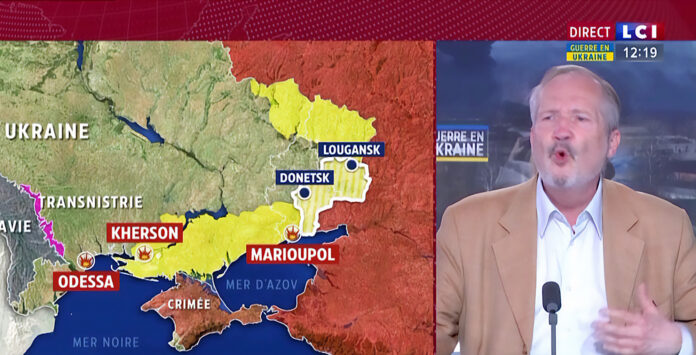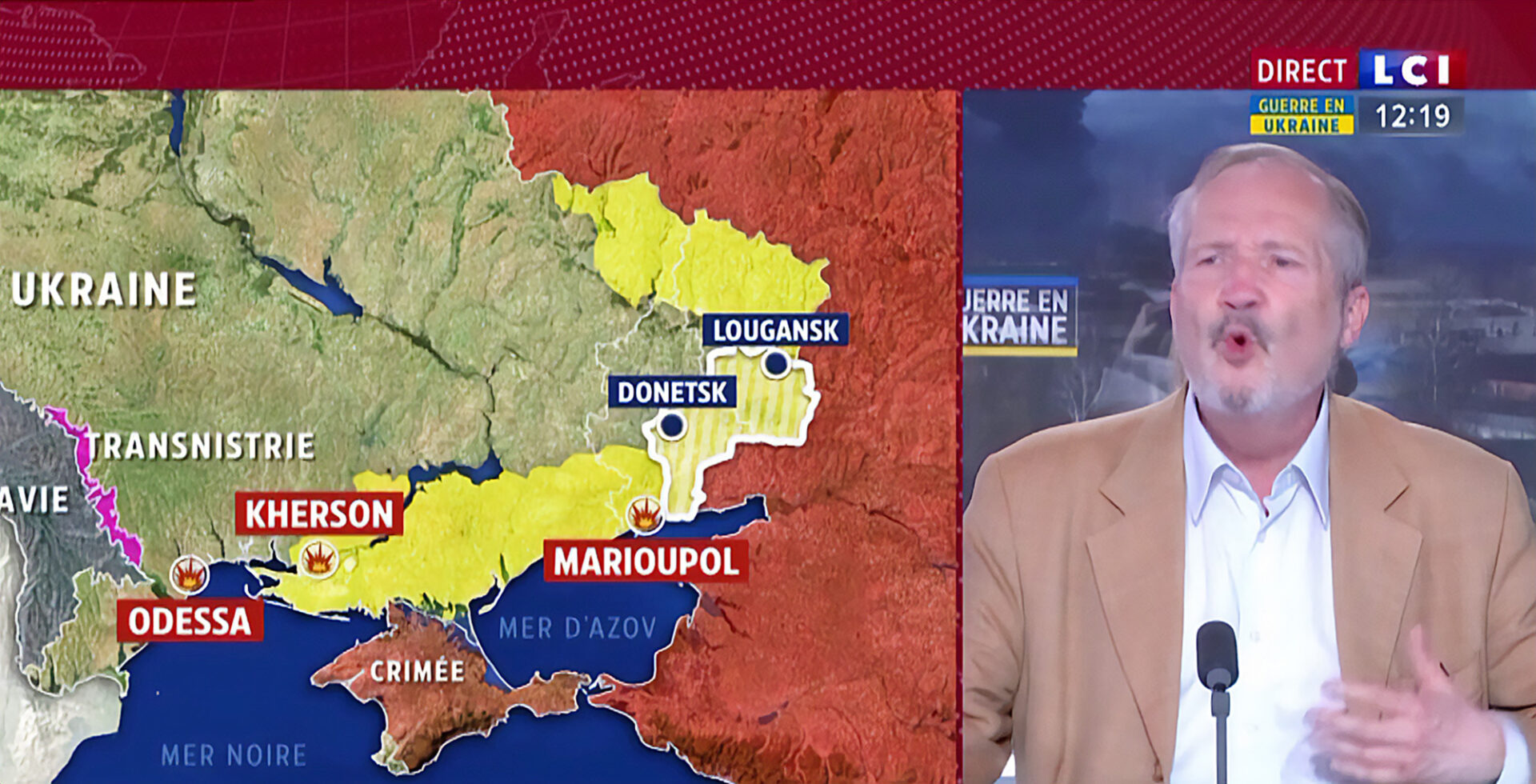Marianna Perebenesiuk, an analyst of Ukrainian origin who is often invited on French TV channels, shares her thoughts on the principles of organizing television debates. Her main thrust is to make the difference between a contradictory debate and commentaries on current events. These commentaries require expertise, but they are sometimes compromised by untruth statements by pro-Putin propaganda heavyweights.
A spoonful of tar in a barrel of honey: this is the image of a Ukrainian proverb that comes to my mind every time I see a more or less unapologetic Kremlin relay on television. The meaning of this very popular proverb should be intuitively clear even to those who do not speak the language: it means that even a small negative contribution is enough to compromise a globally positive debate. And the regular, bitter, and sometimes virulent criticism, not always unjustified, of the media coverage of the war in Ukraine is a sad confirmation of this.
This coverage is, however, of a high quality. French reporters are doing a remarkable job, sometimes, let’s not forget, at the cost of their lives, and the overwhelming majority of newsrooms are doing their best to offer the French people a fair and complete understanding, covering all issues and aspects of this war. This effort is genuine and, in many ways, exemplary. As a witness of this effort and a long-time observer of what was done before, I am in a good position to note this and I thank them for this.
So that’s it for the honey. Let’s move on to the tar.
The demand for continuous information that dominates our society brings a paradox. It demands both a focus on one or several topics that mobilize the opinion and — to make this long focus captivating — it imposes an imperative of an incessant development, even acceleration. This, of course, is impossible in real life, where time is necessarily slower than in the media. In order to compensate for the lack of movement, the media resort to a feeling of movement even when it does not exist: this artificially-felt movement is, so to speak, like a kaleidoscope or a swing.
The kaleidoscope, provided by the variety of angles of view, profiles and images that scroll and overlap, can, as everyone knows from experience, both capture the imagination and make the head spin. When it comes to serious topics, the main problem is that this variety can only exist by mixing elements of unequal quality and importance, while leaving it to viewers to sort it out for themselves. A task that is not easy for journalists and much harder for the general public. Nevertheless, this diversity, by its very nature, is most often useful but I will not dwell on it.
Now, for the swing effect, sought by the media to energize the news, whether it be Ukrainian or on another serious subject, it is much more doubtful. A regular change of position is its principle: change of approach, change of sequence or change of point of view. How is it when you alternate the sequence? Everyone could see this for the Covid-19 crisis. By over-interpreting the data of the day, every four days or so, studio debates sometimes announced a dramatic worsening of the situation, sometimes a spectacular improvement, depriving viewers of an indispensable overview. I am caricaturing, but hardly, and we must admit that this is exactly the impression it gave from the outside. The coverage of the war in Ukraine is in the same vein, and I will come back to this. But we’ll see first what happens when you alternate points of view.
On our television channels and especially on the news channels, the news is rarely sufficient on its own, although it is constantly commented on, often in a debate format, and not in the form of a detailed and in-depth analysis. This is indeed a choice. However, these contradictory debates about the news represent a subtle but significant shift. To understand it, a quick reminder: usually, we can debate the ideas,the opinions,the proposals or the solutions, but we can’t debate the news itself, which would be the same as questioning it. The news, as an established factual truth, is there to decide the debates, to give arguments, to confirm or to deny. Theoretically, the concept of debates mixed with continuous news should be opened by the news bulletin and followed by debates using this news. But we shouldn’t have debates that question news. But, as we will see, in the face of bad faith, this limit is sometimes difficult to hold.
To explore the flaws, let’s see what it looks like in practice. An example among others: at the beginning of April, I shared a BFM-TV (French news TV channel) set with Pierre Lorrain, author of popularized works on Putin, on the Soviet serial killer Chikatilo, on the end of the Romanovs, but also on Ukraine (with a very biased approach). In total astonishment, the war crimes committed en masse in Bucha were still being discovered and the program was devoted to them. Reporters fulfilled their mission to inform the French, they went to this martyred city and documented the evidence of numerous exactions a few days earlier. Here the quality of the journalistic work cannot be questioned, it is indeed journalism reporting proven facts.
When asked about this, Pierre Lorrain, known for his affinity with Russia and invited in this capacity — it is important to point out — first changed the subject to talk about… negotiations and peace. He presented the Russian defeat in the battle of Kyiv and the subsequent withdrawal as a result of these negotiations (a blatant lie in the wake of the official Russian propaganda of the previous days) and insisted that the Ukrainian army had played no role in it. He then made a whole series of quite astonishing assertions: relativizing the images of Bucha which literally flashed before his eyes, affirming that we are “in a fog of war” and that “there is as much disinformation on one side as on the other” (implying therefore that the French journalists are doing a propaganda job for Ukraine? that the images and the evidence don’t exist, because we are “in a fog of war”?) Faced with the indignation on the set, Mr Lorrain continued without blinking: “It is obvious that there were exactions on both sides.”
This, in the absence of any evidence from reliable sources concerning the alleged Ukrainian exactions. This, immediately after the images of Bucha which alone can serve as evidence in a trial for crimes against humanity. This, in perfect agreement, once again, with the official Russian propaganda which that same day, through the permanent representative of Russia to the UN, Vasily Nebenzia, asserted more or less the same thing.
This is how an undeniable piece of news — the war crimes committed en masse by the Russian army and the astonishment they caused throughout the world — found itself relativized, insidiously invalidated, at least in part, by a debate that was not even intended as such.
This situation, far from being an isolated case, raises so many problems that we don’t even know where to start. So let’s start at the beginning: Mr Lorrain was invited on this set as a pro-Putin voice, with the idea, in my opinion sincere, to establish a balance with the Ukrainian presence, which has become, it’s true, very important since the beginning of the invasion. This had been confirmed to me by the journalists in charge of the program. At the risk of shocking some, I confess that I am not opposed to this principle, even if the ethical aspect of the confrontation of Ukrainian speakers, shocked by the drama their relatives are living, with analysts showing a certain leniency toward the Kremlin should be taken into account seriously.
Starting with the fact that the confrontation is between someone with little experience against experts who have decades of media coverage under their belts, who are necessarily more at ease, who can express themselves in their native language, who know the codes and rules of the game better, putting a private individual against a professional is not fair play, even if the original concern was precisely that. The second problem concerns the care to warn them so that they can refuse it: the least we can do to avoid unnecessary shocks to those who come on the set not to debate, but to give a testimony or to shed light on the Ukrainian context. To warn the public too, because although invited as pro-Putin, these experts are rarely presented as such to the public: this practice gives rise to confusion with the genuinely neutral and impartial experts, who are in the vast majority. The problem of markup is obvious. Even the devil can have the right to a lawyer.
However, this is where the problem lies: lawyers are subject to a professional code of ethics, a process and rules to be respected, which is not necessarily the case for “Russia’s lawyers”. Thus, invited to comment on the news that reaches us from Ukraine, many of them don’t hesitate to do what they are not supposed to do: telling untruths, questioning established facts, relaying elements of Russian propaganda — sometimes “fact-checked” for years —, claiming things that they are not able to argue. In short, many are either in bad faith or incompetent (you choose). And now, surprise: this is not considered a big problem, instead, because we are in an open debate, and the other speakers are there to contradict possible lies, manipulations and other errors. In a way, it is even welcomed, because it allows a reminder by a convincing public denial. In short, it would be educational.
Except that: 1) it depends mainly on the allocation of time to speakers — often, it isn’t possible to take up everything; 2) the moderator is sometimes not able to do this task, as we have just seen; 3) a lie mixed with news, even if it is refuted, remains there forever: it has been heard and it will unavoidably stay with some of those listening. It is even for this reason, and rightly, that most of the French media nearly never quoted the lies of the TASS agency on the circumstances of the death of Frederic Leclerc-Imhoff [a French reporter killed in Ukraine in May 2022], if not to denounce them: there is no need to stir up false propaganda that spits on the victim, taking the risk that some people might end up believing it. This is a good decision. But it’s hard to understand why they can’t systematically apply the same rules for the speakers on the set?
The question of the usefulness of having to refute the same lies over and over again, when they can simply avoid inviting those who have proven to be unreliable, remains open.
To return one last time to my initial example: of course, I took advantage of my presence on the set to ask for evidence of the alleged equivalence between Ukraine and Russia in terms of exactions and in terms of propaganda. Of course, Admiral Vichot, also present on the set, refuted the idea that the Ukrainian army didn’t inflict a defeat on Russia in the battle of Kyiv, forcing the Russian troops to withdraw. Of course, the hosts and the channel’s columnist, myself and another guest publicly refuted what had been said. The problem is that after this program, where Mr Lorrain’s expertise (or good faith, as the case may be) was clearly refuted by the debate, he continued to be invited, on the same channel or elsewhere, as if nothing had happened, always with the same result.
Far from me to suggest that any refutation, even a solid one that leaves no doubt, should be disqualifying: everyone can be wrong or have his or her own blind spot, even if a subject as serious as the Russian invasion of Ukraine should normally call for particular rigor from everyone. But when it is a question of real untruths, of well-identified elements of propaganda, when it is not one point that must be refuted but a whole series or even the entire discourse, and this, from one TV set to another without any consequences being drawn — then you begin to wonder.
We even arrive at insane situations where from one program to the next, a few days later, the same speakers reproduce the same arguments that were already dismantled before. What exactly is this about? What do these experts expect when they inflict this repeated humiliation on themselves, when they know perfectly well and empirically that their discourse has no sense? Why don’t they change their discourse and their positions? Are they really here to give their expertise or just to sow doubt and monopolize time? And what about these invitations? Is it due to some mistake from the programmers, or a lack of coordination between the teams of different programs? Or is it an obvious desire to recreate the same confrontation over and over again to increase the audience, even if it means letting misinformation spread?
Whatever the reason, this is how, week after week, some guests talk about “Russian-speaking Donbas victims of Ukraine and ask Russia for help”, the exact opposite of what is shown in the TV reports that intersect the discussions: Ukrainian inhabitants of Donbas are bilingual, express themselves as they want, the inhabitants of Russian-speaking Donbas are in fact the victims of Russian aggression, etc.
Week after week, the public discovers the big difficulties Ukrainians have to obtain heavy weapons and train their soldiers, while Ukraine is a sovereign country with a regular army. However, there are still people talking about “separatists in 2014”, who had, remember, tanks, artillery, anti-aircraft protection and even aviation.
Week in week out, news reports mention Russian threats against Sweden, Finland, Poland or the Baltic States — economic and energy retaliation, military maneuvers, statements by politicians, threats made freely by Russian propagandists: it is all here. Well, week in week out, “experts” are found to assert the opposite and reproduce the Kremlin’s idea about “Baltic countries and Central Europe obsessed with Russia.”
There is a long list of Kremlin propaganda elements which are mixed daily with the news produced by journalists, and which relativize or even invalidate it — without the slightest argument, without the slightest number, without the slightest fact. I have already heard a “geopolitical expert” support his assertion about Ukrainian Russian speakers who would like to join Russia with a single argument — a sociological or anthropological study? an analysis of the political landscape? No! “I’ve been in Ukraine.” Here we are.
But let’s come back to the honey and the tar.
As I have explained, a few dubious “experts”, most of whom bring no added value to the debate or decoding, do a lot of damage. The solution is as simple as it is painless: increase vigilance and pay a little more attention to the background of a possible “pro-Putin” guest. Simple, easy enough and, as I said, painless from a media point of view: the public will not even notice that a number of former officials or writers are left where they were — in their well-deserved retirement.
To go further, we should perhaps get away from the idea of wanting to organize debates at all costs and have more confidence in the specialists we invite. If there is a consensus among competent specialists, this may indicate precisely this: things are clear. We must get away from the idea that without these Kremlin relays, consensus will prevail everywhere. The months of the war have clearly proved it: experts on Russia and experts on Ukraine are not necessarily in disagreement, which does not prevent these experts, sharing the same findings on the same bases, to defend radically or partially different solutions. In short, the channels must choose competent and good faith speakers and trust them.
And it is necessary to open a debate on the role given to Ukrainian speakers, because after all it is their presence that most often raises the question of the balance of representation. Who are they? Are they there as witnesses? Are they commentators and/or experts able to decipher Ukraine and analyze the situation? Are they propagandists in charge of defending the country that has been attacked (the only case that would justify the symmetrical use of pro-Russian propagandists)? This is a serious question and the answer dictates, in each specific case, the right mix of guests on television sets.
Marianna Perebenesiuk is a comparative literature specialist with expertise in French literature, the publishing and audiovisual industries. She has authored an essay in thanatology and has worked with production companies and NGOs. She also collaborates with the Ukrainian national weekly magazine Ukraïnskyi Tyzhden and provides insights into the Ukrainian context in French media, especially since the beginning of the war.




